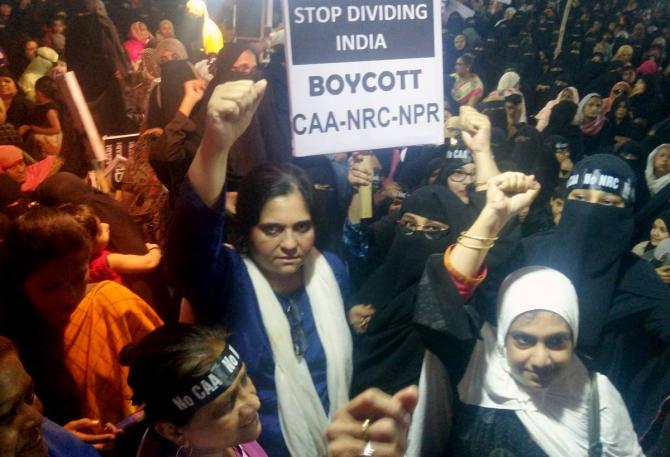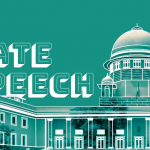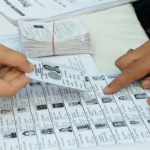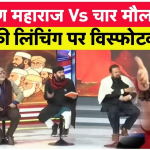‘We have become passive consumers of hatred’ rediff
27, Sep 2022 | SYED FIRDAUS ASHRAF
The right wing has worked for 70-80 years at the grass roots before it burst onto social media.’
‘Social media is an extension of its formidable work in society.’
‘If you think you can fight them on social media, forget it. You can’t.’

Activist Teesta Setalvad spent 63 days in jail and seven days in remand following the Supreme Court’s strictures against her in its verdict dismissing Zakia Jafri’s petition against the clean chit given by the special investigation team to then Gujarat chief minister Narendra Modi and others in the 2002 post-Godhra riots cases.
Enlarged on bail recently, Setalvad is unfazed by what she went through, and continues to believe that journalism or activism is about a small individual effort at social transformation, change.
In the first part of her interview to Syed Firdaus Ashraf/Rediff.com, Setalvad spoke about not losing hope in the country’s secularism. In this second part of her interview, she speaks of how the battle against hatred can still be won.
There are 70-80 redevelopment projects happening around Bandra to Juhu (both suburbs in north west Mumbai). Housing societies are making millions of rupees from their land deals. Here you have your own bungalow in Juhu. Don’t you feel you should make money rather than fighting for the cause of riot victims of Gujarat?
How did an upscale Juhu girl chose activism rather than a capitalist way of life?
I was in the 7th standard and at that time I read the book All the President’s Men (Washington Post reporters Bob Woodward and Carl Bernstein’s reportage on the Watergate scandal that ejected then US president Richard Milhous Nixon from office).
My father was very supportive and he told me you do what your conscience tells you. I did that by reading, writing in my college days and voicing my views on politics. All of this made a difference. I read a lot of books and even in jail I was reading.
For me journalism or activism it’s about a small individual effort at social transformation, change.
I think I was more into transformative journalism rather than (being) a Page 3 journalist. I was transformed that way in my early days as a student.
But how did you imbibe this conscience to talk about helpless poor riot victims? Most people don’t have it in them and given a choice they will kill that conscience.
The first thing that should come to your mind is that what you are doing is right. What I am saying is that you have to ensure that Constitutional values are implemented for the most vulnerable people of our country.
Muslims, Dalits, Adivasis and the working class are very vulnerable in our country today. It is important to understand that we are born into privilege. And it is this privilege that gives you certain responsibility.
Forget about me, look at our freedom movement. There was a section of the elite that jumped onto the freedom movement of India. The first 20-30 years of Independent India, there was a connect of these elites with the people of India.
Today, it is a divisive connect and polarised connect which is very dangerous.
Do you feel this conscience to speak up for the weaker sections and minorities can come to people naturally or does someone have to arouse it in them?
I think most people have a conscience. Every human being has a conscience, but there has to be space, context and conversation where we all get politicised.
I got politicised in Class 10 when the Emergency was declared in India by the Congress government under Indira Gandhi. Then in 1977 elections were declared. My parents told me at that time to forget about exams and campaign for the Janata Party as they wanted the Congress party to go out.
There were homes of lawyers in Mumbai where my father and (the distinguished lawyer) Iqbal Chagla would hold meetings to mobilise (people). And that is why Janata Party Law Minister Shanti Bhushan came to thank the lawyers of Mumbai. He came to Mumbai only to thank the lawyers.
I was 16-17. I used to collect posters and paste them in city trains. All of us felt that the Emergency was wrong. After that, things did not stop for me as I started looking around at what was happening in the country.
In 1984, when I was one year old in journalism, I covered Mumbai city and my partner Javed Anand covered the Bhiwandi riots. In Ansari Baug in Bhiwandi, 23 people were charred to death in those riots. This was in May 1984 and one month later, in June 1984, Operation Bluestar happened. The same November, Sikh brothers and sisters were killed in the Delhi riots. Bhopal (the gas tragedy) too happened.
1984 was an Orwellian year for India. You could see the shift of the country to a majoritarian State. The Congress party in power, but what happened to Sikh brothers and sisters in Delhi, Kanpur and other cities of India was shocking. You then start thinking about all this in your formative years. And your upbringing matters here.
It is very easy for people born in liberal families to imbibe these liberal values. But how can someone born in a strict religious orthodox family change his or her views considering the fact that today the country is polarised on communal lines?
I think society needs to allow them to give space. The example which I gave you earlier, what is that space? It can be in college. It can be in school. It can be in study centres. It could be a film circle which you attend and suddenly you think differently from the way you are brought up.
Those spaces have vanished today. Things are happening on social media and we have become passive consumers of this hatred.
What we need to do is create spaces for discussion, for alternate ideas and for dialogue. And that is very difficult in this fractured, polarised, environment.
It is tough. But we have to do it.
There is a strong right wing ecosystem in India today. Is it easy to challenge it?
Don’t fall for that language. I keep telling people who get overwhelmed by social media that the right wing has worked for 70-80 years at the grass roots before it burst onto social media. Social media is an extension of its formidable work in society.
People forget that. If you think that you can fight them on social media, forget it. You can’t.
You start by building from bottom up with small groups who question, who can create safe spaces, who create intelligent spaces and who create discussion points. In this space you cannot have violence or intolerance.
The original piece may be read here










